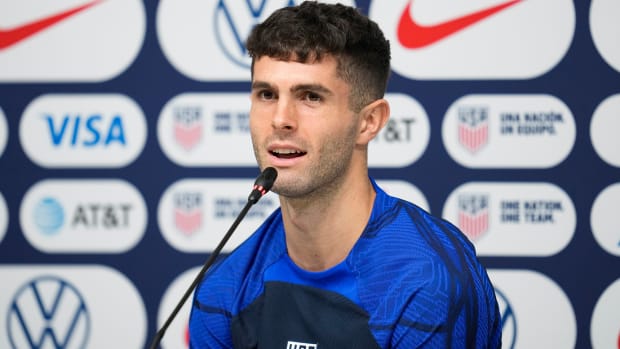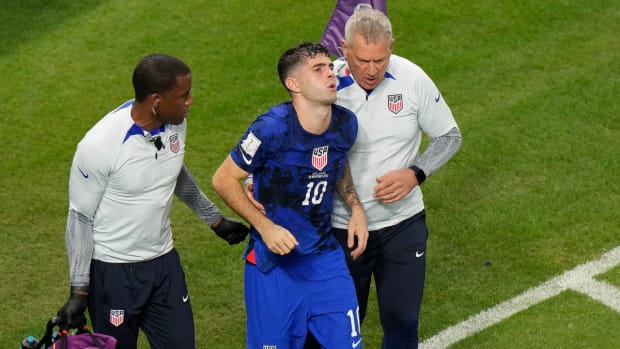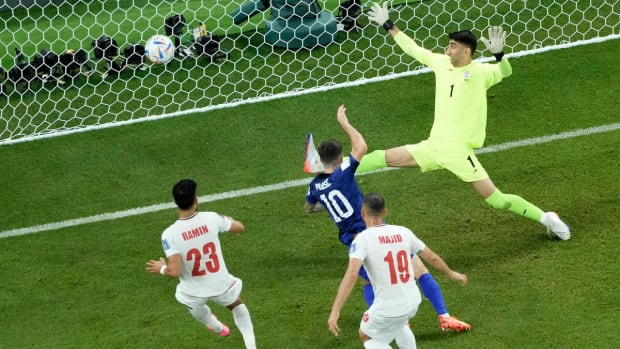As long as Christian Pulisic is medically cleared, he’ll be out there vs. the Netherlands, looking to make his goal vs. Iran a footnote on an even grander story.
AL RAYYAN, Qatar—The comparisons have been there for years now, noting how one lithe but powerful, ultra-skilled and occasionally pensive or moody American soccer savior from the suburbs of central Pennsylvania reminds us of his predecessor from the suburbs in San Bernardino County, Calif.
Christian Pulisic is, and Landon Donovan was, the most consistently dangerous and dynamic attacker in a U.S. jersey. They have, and had, a knack for unlocking defenses off the dribble, making magic in tight spaces and arriving with speed at just the right spot in just the right moment. They are, or were, the faces of their national side and of their generation—the players most often relied upon by teammates in the clutch, and most often elevated and analyzed by fans and media. That scrutiny is something that both men don’t, or didn’t, always have an easy time accepting.
And now they’re connected by World Cup heroics. Donovan’s iconic 2010 goal against Algeria, which catapulted the U.S. from elimination to top of its group in the time it took the ball to travel eight yards, is legendary in large part because of the last-gasp, stoppage-time drama that surrounded it.
Pulisic’s game-winner against Iran on Tuesday in nearby Doha came in a first half the Americans dominated. But it was no less impactful. His goal lifted the U.S. to a 1–0 triumph in a must-win match and into Saturday’s round-of-16 tilt against the Netherlands. It came at a cost, leading to a collision and pelvic injury that forced Pulisic to the hospital and leaves him listed as “day to day.” And it ensured this young team’s most prominent player made his indelible mark on this World Cup.
Now the difference: Donovan’s goal came in his third and last World Cup, and it was the play that in many ways crowned and defined his international career. Pulisic is appearing in his first, and he suggested here Thursday that it wouldn’t be the worst thing if the Iran goal becomes a footnote.

Ashley Landis/AP
“It feels great to score in a World Cup,” Pulisic said at the Americans’ Al Gharafa training site. “I’m hoping I haven't had that [Donovan] moment yet, to be honest. I'm hoping it's in front of me. So it’s just great to be where we're at right now. But there's still more to come.”
His World Cup had been decent before that play, which started with a looping ball from Weston McKennie toward right back Sergiño Dest and then a quick headed cross to an onrushing Pulisic at the left post. Pulisic has looked fit and active. He set up Tim Weah’s goal in the 1–1 draw with Wales in last week’s opener with a long dribbling run followed by a perfect, subtle through ball. Pulisic then hit the crossbar against England and was involved in a couple of other chances. But there were issues too, most notably in his inconsistent orchestration of the U.S. counterattack and some questionable decisions in transition.
“I'm happy with [my] performances,” he said Thursday. “To score a goal and help the team in any way I can is what I'm here to do. So you know I want to make big plays, and I want to do what I can help this team. But by no means do I want [the Iran goal] to be the only thing I look back on in this tournament. So there's still a lot ahead of this team and myself.”
Seconds after the ball went in against Iran, Pulisic was on the ground in obvious agony. He said he realized that his teammates weren’t celebrating and instinctively worried that there may have been an offside call.
“You never know nowadays, so I wasn’t sure what was going on,” he said.
But even once the goal was confirmed, there was no joy. Pulisic was treated on the sideline for some time and then gamely finished out the first half. But he was on his way to the hospital shortly thereafter—he was experiencing dizziness, according to coach Gregg Berhalter—and followed the action, and the Americans’ desperate bid to hang on to their slender lead, from the team trainer’s phone.
“It was a crazy kind of experience for me,” he recalled. “They were checking my blood sugar and everything and it was flying through the roof, but it wasn't because of anything [wrong]. It's just my stress watching the game. But once I got through that, and the final whistle blew I was obviously very happy.”

Luca Bruno/AP
Those anxious moments weren’t sparked by a lack of faith, however. Pulisic was at the vanguard of this ambitious cohort of American players that now populates the best leagues in Europe. He left for Germany at 15, scored in the UEFA Champions League for Borussia Dortmund at 18, and then won that tournament with Chelsea at 22. Pulisic was a bright spot in the U.S.’s doomed 2018 World Cup qualifying campaign while still a teenager and in the early days under Berhalter, he often felt like he had to shoulder too much responsibility. Then the group around him came of age, and he learned to count on them as much as they leaned on him.
“This team helps me so much to take the pressure off of me,” he said. “A couple of years ago, there were times where maybe I felt like I needed to do more, but with these guys I don't feel that way at all, to be honest. I know they have my back.
“I know when I went down [against Iran] and I see Brenden [Aaronson, his replacement] running on the pitch, I'm not worried at all because I know these guys,” he continued. “I mean, you see the talent. You see the work that they've put in and just the unity of this group is what makes it special and takes any pressure that there might be off me.”
That’s made the national team, and thus the World Cup, almost a refuge for Pulisic, a place of comfort and confidence where he feels free to play without fear the fickle judgment that often seems to follow him around England.
“We sat near each other on the flight [to Qatar], and we were just talking a little bit—a little bit about that kind of stuff,” said U.S. goalkeeper Matt Turner, who plays across London at Arsenal. “I like to get to know people and what makes them tick. … And he's just excited. He's excited to be here. He felt the pain and the heartbreak of the [2018] very personally, I know. So for him to be here now, he’s excited to go and express himself and be on the world stage.”
Speaking to Sports Illustrated over the summer, Pulisic said, “When I go to the national team, it's always great. That's the first thing, getting to speak to people that can relate to you very easily and a lot of close friends that I've played with for quite a long time. That's always good.
“Sometimes, with long seasons and a lot of ups and downs, it can be very good to get away and the national team is an amazing place for it. And I'm very honored to be in the position I am with the national team having been there for quite a few years, and getting back there and playing is always a breath of fresh air.”

Hassan Ammar/AP
Pulisic insisted after landing in Qatar that he was healthy and that he felt his form at Chelsea had been good. He arrived at the World Cup with just a couple recent starts under his belt and with Chelsea reeling, but said he was “strong” and “prepared going into this.” For the most part, his performance has matched that prediction. He’s played a part in both U.S. goals and, if he’s able to bounce back from his “pelvic contusion”—Pulisic promised Thursday, “I didn’t get hit in the balls”—and take the field against the Dutch in Al Rayyan, old concerns about his durability will be put to rest.
If Pulisic is there in uniform at Khalifa International Stadium, he’ll naturally be a focus and center of attention. If the U.S. pulls the upset and wins just its second World Cup knockout round match in 92 years, his goal against Iran will take on even more importance. His stature will rise further. But Pulisic would be just fine if everyone paid attention to the team as a whole. That's what centers him. He’s happy to share the spotlight, and is convinced it’s that collective that has brought him this far, and will pave the way for more.
“I hope that [the public] can see just the unity and the team spirit that we display. I hope that's what's helping us gain fans,” he said Thursday. “I hope people watching, especially back home in the States, can see ‘Wow, these guys are really giving everything for each other, for this country,’ and that's what really makes us special.
“You can see all the individual talents. We have guys playing at top clubs across the world,” he concluded. “But without the brotherhood and without this family aspect, we wouldn't be in this position.”